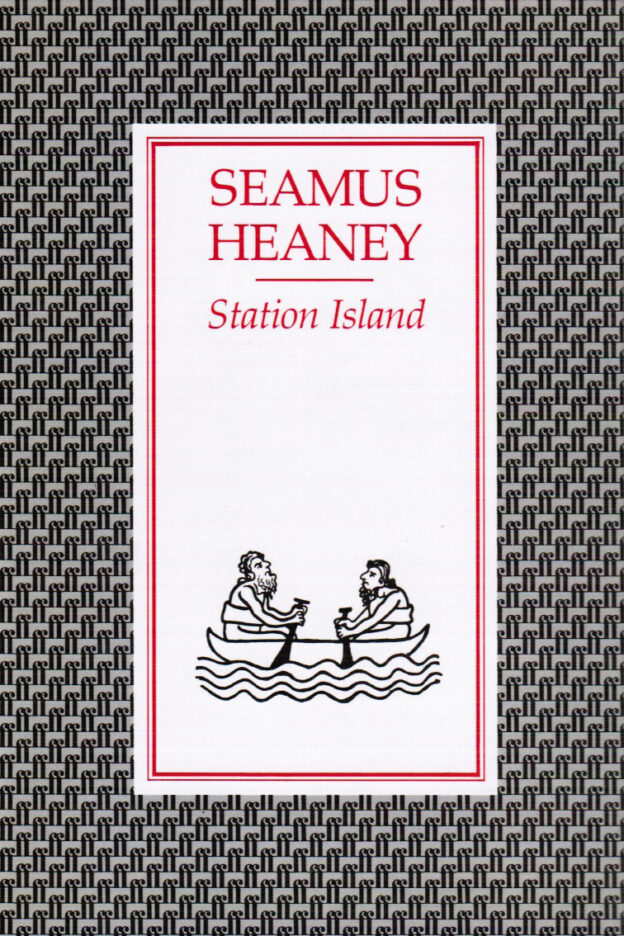Seamus Heaney’s “Making Strange”, from Station Island (1984), has served as one interpretive touchstone for our latest workshop on the theme of “Displaced Selves”. Heaney’s meditation on how identity is informed by the experience of travel, the tensions of cultural exchange, and the affordances of intellectual encounter, enriched our understanding of the texts and films that followed as sites where “displacement” in the world leads the self to assume new forms. We are happy to be sharing original translations of Heaney’s poem in Italian and Portuguese!

Making Strange
I stood between them,
the one with his traveled intelligence
and tawny containment,
his speech like the twang of a bowstring,
and another, unshorn and bewildered
in the tubs of his wellingtons,
smiling at me for help,
faced with this stranger I’d brought him.
Then a cunning middle voice
came out of the field across the road
saying, ‘Be adept and be dialect,
tell of this wind coming past the zinc hut,
call me sweetbriar after the rain
or snowberries cooled in the fog.
But love the cut of this travelled one
and call me also the cornfield of Boaz.
Go beyond what’s reliable
in all that keeps pleading and pleading,
these eyes and puddles and stones,
and recollect how bold you were
when I visited you first
with departures you cannot go back on.’
A chaffinch flicked from an ash and next thing
I found myself driving the stranger
through my own country, adept
at dialect, reciting my pride
in all that I knew, that began to make strange
at the same recitation.
From Opened Ground: Poems 1966-1996, Faber and Faber, 1998, pp. 221-222.
Italian translation
Straniamento
Stavo fra loro due,
l’uno con con la sua intelligenza da viaggiatore
e il suo contegno fulvo,
il suo parlare come schiocco d’arco,
e l’altro non rasato e confuso
nelle tinozze dei suoi stivali di gomma,
che sorrideva per chiedermi aiuto,
davanti all’estraneo che gli avevo portato.
Allora un’astuta voce intermediaria
venne dal campo, dall’altra parte della strada
e disse: «Sii abile e sii dialettale,
parla di questo vento che lambisce la capanna di zinco,
chiamami rosa selvatica dopo la pioggia
o bacche bianche fresche nella nebbia.
Ma ama i modi di quest’uomo viaggiatore
e chiamami anche campo di grano di Boaz.
Vai oltre il credibile
verso tutto ciò che non smette di supplicare e implorare,
questi occhi e pozzanghere e pietre
e ricorda com’eri audace
quando ti visitai la prima volta
con partenze da cui non si può tornare indietro».
Un fringuello guizzò fuori da un frassino e subito dopo
mi trovai a guidare l’estraneo
nel mio proprio paese, abile
nel dialetto, declamando il mio orgoglio
in tutto ciò che sapevo, che cominciò a straniarsi
nel momento stesso in cui lo declamavo.
(Italian translation by Sara De Simone)
Portuguese translation
Estranhar
Eu estava entre eles,
um com a sua inteligência viajada
e morena contenção,
a sua fala semelhante à corda de um arco,
e outro, lanzudo e desnorteado
dentro dos canos das galochas,
a pedir-me ajuda com um sorriso,
confrontado com este estranho que eu lhe trouxera.
Então, uma astuta voz mediadora
saiu dos campos, do outro lado da estrada,
dizendo “Sê hábil e sê dialecto,
fala deste vento que passa pela cabana de zinco,
chama-me roseira brava depois da chuva
ou bagas de madressilva geladas do nevoeiro.
Mas ama a figura deste que é viajado
e chama-me também o campo de milho de Boaz.
Vai além do que é seguro
em tudo o que está sempre a suplicar e a suplicar,
estes olhos e poças e pedras,
e recorda quão ousado foste
quando te visitei primeiro
com partidas às quais não podes regressar.”
Um tentilhão esvoaçou de um freixo
e dei por mim de repente a conduzir o estranho
pelo meu próprio país, hábil
no dialecto, a recitar o meu orgulho
em tudo aquilo que conhecia, aquilo que se começou a estranhar
nessa mesma recitação.
(Portuguese translation by Amândio Reis)
